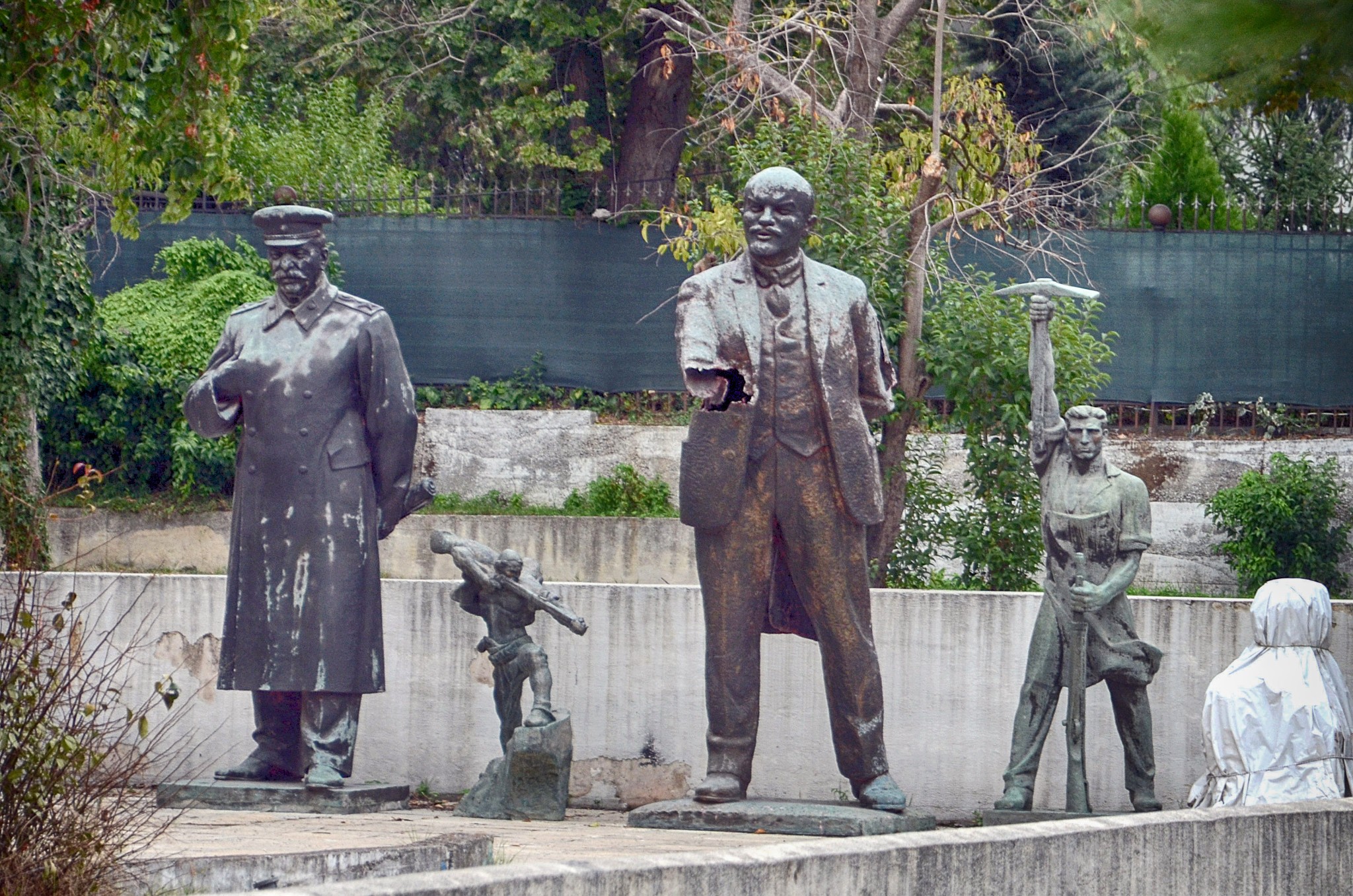 Statues of Stalin and Lenin at the National Art Gallery in Tirana, Albania, September 26th, 2015. Photo Courtesy of Pasztilla via Wikimedia Commons
Statues of Stalin and Lenin at the National Art Gallery in Tirana, Albania, September 26th, 2015. Photo Courtesy of Pasztilla via Wikimedia Commons
Putin’s Historical Mindset is Endemic to the Halls of the Kremlin
Earlier this month, Putin commemorated the 80th anniversary of the German defeat in Stalingrad. As part of the ceremony, a bust of Stalin was erected outside the Battle of Stalingrad Museum in Volgograd (formerly known as Stalingrad). This heroic portrayal of Stalin and the “Great Patriotic War” (WWII) serves as a means of enabling Putin’s narrative. Putin employs stories of Russia’s past glories and struggles to justify his actions, as seen in the prelude to the invasion when he published documents and gave speeches describing Ukraine as a wayward little brother with no right to sovereignty. Putin’s extensive use of manipulated and often contradicting historical contexts, paired with his authoritarian policies, enables Russian aggression and is a tool for sustaining this war effort. Russia’s expansionist attitudes against former Soviet states will continue because of this historical and nationalistic mentality among Putin and the siloviki (decision-makers).
Russia’s history of devastating invasions by the Mongols, Napoleon, and Nazi Germany, to name a few, crafted the modern Russian strategic psyche. Whereas in the U.S., the threat of invasion is not a significant aspect of strategic thought, Putin and the siloviki were born into this strategic psyche, which continues to influence their policy decisions. Indeed, the historical contexts that Putin uses, align with this psyche. Since the color revolutions of the early 2000s, Putin has been carefully manipulating Russian history to shape the shared Russian strategic psyche. He has framed NATO as an invasion force, painted Zelensky as a Nazi to make the Ukrainian government an easily identifiable enemy familiar to the Russian narrative, and condemned global support for Ukraine as an attempt to “tear apart” Russia. Putin’s evidence for his historical mindset is often hypocritical, such as his accusations against the West for promoting arms proliferation while he suspends the New START agreement. But the historical mindset does not need to be perfect, just good enough to warrant some legitimacy to Putin’s actions in the eyes of Russian citizens.
In his February 21st national address, Putin again affirmed his ideology. He asked the families of fallen Russian soldiers in the Donbas to cherish their memories like the Young Guard of Krasnodon from “the Great Patriotic War.” He also encouraged his fellow citizens to support Russian businesses and stimulate economic growth outside Western influence, drawing similarities to the post-WWII Soviet economic strategy. The Russian government’s use of historical contexts is helpful in its attempts to maintain legitimacy and justify the war. But, as a source of individual persuasion, a historical mindset is less powerful, as demonstrated by the flood of hundreds of thousands of Russians to neighboring countries after Putin announced a mass mobilization in September 2022.
Instead of individual persuasion, Putin’s regime uses its monopoly of violence and authoritarian tools to encourage, coerce, and force obedience to the Russian state’s ideology. Opposition to this ideology is punished harshly, as evidenced in March 2022 when Putin signed into law strict censorship laws that promise to jail anyone that spreads anti-war messages, protests the war, reports “false information,” or even recognizes the “special military operation” as a war. Russian domestic organizations like Project 1917 and Memorial attempt to discredit Putin’s historical contexts but are heavily sanctioned and silenced by the regime. Putin also combats social institutions such as art exhibits, musical groups, and news agencies that oppose his ideology. In a democracy, ideological and historical contexts would need to have solid foundations in reality, but thanks to his total control of the state and ability to suppress opposition, Putin can justify his desires with whatever he wants. Barring significant government upheaval or widespread societal change, the historical mindset will continue to reign supreme in the Kremlin’s halls no matter the outcome of Russia’s Ukrainian invasion.
Unlike the end of WWII, where the victors restructured Germany and Japan’s governments, there will be no occupation of Russia by the West. There may be some governmental changes in Russia after a defeat, but Putin’s historical mindset is endemic to the halls of the Kremlin. After a period of retrenchment and recuperation, Russian gray zone aggression in the former Soviet sphere will return—particularly as Putin fortifies himself against the consequences of his failure. The U.S. was mistaken to relegate its Russian intelligence and policy infrastructure after the fall of the Soviet Union. Georgia in 2008 was a blip on the radar, Ukraine in 2014 was a bigger blip that struck some alarm but little action, and now the invasion of Ukraine shows the magnitude of the failure. After a Ukrainian victory, the U.S. must not become complacent; it must prepare for a later Russian reprisal and bolster the democratic world against the continued threat of authoritarianism.
Photo licensed under Creative Commons Attribution-ShareAlike 4.0 International (CC BY-SA 4.0).





